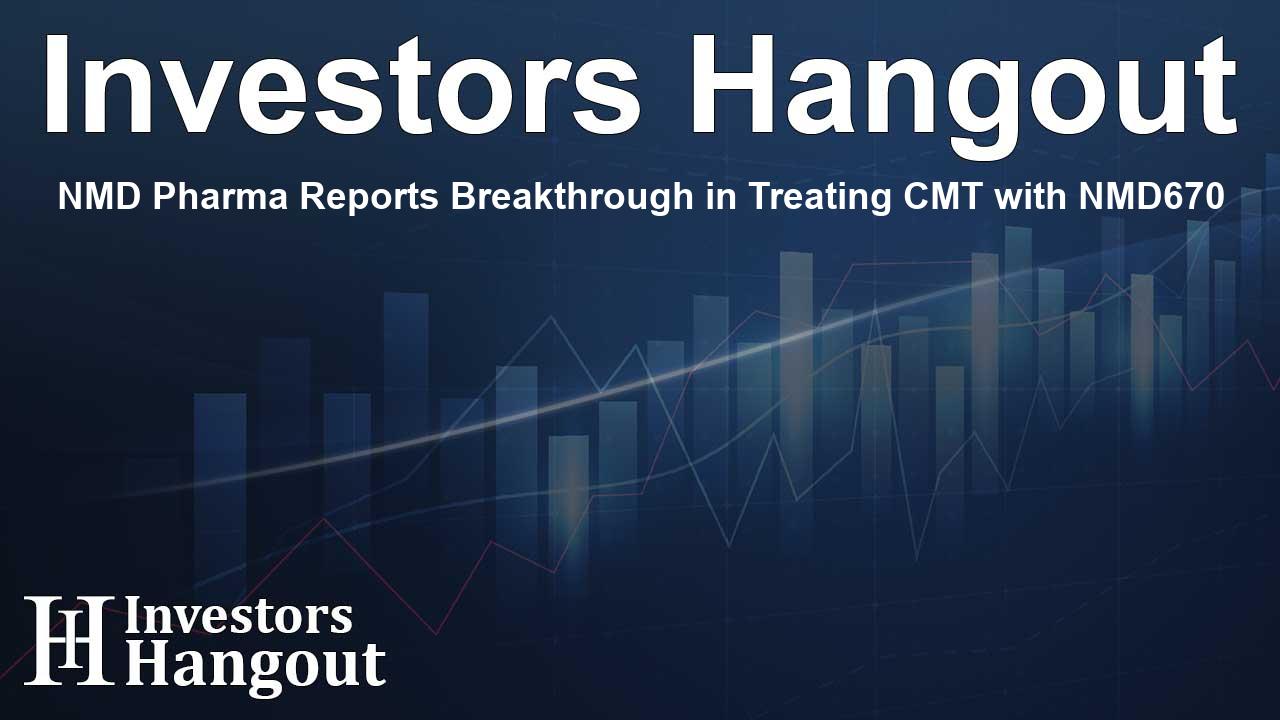NMD Pharma Reports Breakthrough in Treating CMT with NMD670

New Insights from NMD Pharma on ClC-1 Inhibition in CMT
NMD Pharma has recently made headlines with promising findings regarding neuromuscular dysfunction in Charcot-Marie-Tooth (CMT) disease, specifically focusing on the role of ClC-1 inhibition. The results emerged from an observational study named ESTABLISH, which underscores the critical relationship between neuromuscular junction (NMJ) dysfunction and muscle function impairments in CMT patients.
Understanding Neuromuscular Junction Dysfunction
NMD Pharma’s study confirmed something significant: many individuals diagnosed with CMT types 1 and 2 experience notable NMJ transmission issues, a factor that contributes to their muscle weakness and fatigue. This can impair day-to-day activities, leading to a decreased quality of life. This study broadens our understanding of the neuromuscular mechanisms that underpin CMT.
Significance of ClC-1 Inhibition
By utilizing a novel small molecule known as NMD670, researchers demonstrated its ability to improve muscle function in animal models mimicking CMT. Following treatment, animals displayed enhanced muscle contractility, highlighting how ClC-1 inhibition could revolutionize therapeutic approaches for CMT.
Clinical Implications and Future Trials
W. David Arnold, MD, one of the principal investigators, remarked on the lack of available therapies for CMT. His findings are viewed as a significant step toward developing viable treatment avenues that directly target NMJ dysfunction, potentially addressing both muscle weakness and fatigue in patients.
Initial Phase 2 Clinical Trial Insights
To capitalize on these findings, NMD Pharma has initiated a Phase 2 clinical trial assessing the safety and efficacy of NMD670 in patients with CMT. This is a pivotal phase in testing the real-world applications of ClC-1 inhibitors, with hopes that it could yield transformative results.
Continuous Progress in CMT Research
In an ongoing effort to understand and combat CMT, NMD Pharma also announced that patient treatment has begun in their Phase 2 trial for NMD670. Alongside the CMT trials, the company is also focused on developing therapies for spinal muscular atrophy and generalized myasthenia gravis, showcasing their dedication to addressing various neuromuscular disorders.
About NMD670 and its Potential
NMD670 represents a groundbreaking approach in stabilizing and enhancing neuromuscular function. As a first-in-class small molecule inhibitor of the skeletal muscle chloride ion channel 1 (ClC-1), it fine-tunes muscle responsiveness to neural signals. Preliminary studies have shown its effectiveness extending beyond CMT, including indications in myasthenia gravis and spinal muscular atrophy.
Conclusion: A Future with Hope for CMT Patients
The innovative approaches undertaken by NMD Pharma provide a beacon of hope for CMT patients, enhancing our understanding of this complex group of disorders. With continued advancements in therapeutic strategies like NMD670, there is growing optimism for improved management and potential relief from the debilitating effects of CMT.
Frequently Asked Questions
What is NMD Pharma's role in CMT research?
NMD Pharma is leading ground-breaking research on ClC-1 inhibitors and their potential to treat Charcot-Marie-Tooth disease, enhancing understanding and therapeutic options.
How does ClC-1 inhibition help CMT patients?
ClC-1 inhibition has been shown to improve neuromuscular function, addressing significant issues related to muscle weakness and fatigue experienced by CMT patients.
What is the ESTABLISH study?
The ESTABLISH study is an observational clinical study that has confirmed the presence of neuromuscular junction dysfunction in CMT patients, regardless of their genetic background.
What are the next steps for NMD Pharma and NMD670?
NMD Pharma is actively conducting a Phase 2 clinical trial to evaluate the safety and effectiveness of NMD670 in CMT patients, with ongoing assessments to refine treatment plans.
How prevalent is Charcot-Marie-Tooth disease?
CMT affects approximately 136,000 individuals in the United States and around 3.2 million people globally, typically presenting symptoms during adolescence.
About Investors Hangout
Investors Hangout is a leading online stock forum for financial discussion and learning, offering a wide range of free tools and resources. It draws in traders of all levels, who exchange market knowledge, investigate trading tactics, and keep an eye on industry developments in real time. Featuring financial articles, stock message boards, quotes, charts, company profiles, and live news updates. Through cooperative learning and a wealth of informational resources, it helps users from novices creating their first portfolios to experts honing their techniques. Join Investors Hangout today: https://investorshangout.com/
Disclaimer: The content of this article is solely for general informational purposes only; it does not represent legal, financial, or investment advice. Investors Hangout does not offer financial advice; the author is not a licensed financial advisor. Consult a qualified advisor before making any financial or investment decisions based on this article. The author's interpretation of publicly available data shapes the opinions presented here; as a result, they should not be taken as advice to purchase, sell, or hold any securities mentioned or any other investments. The author does not guarantee the accuracy, completeness, or timeliness of any material, providing it "as is." Information and market conditions may change; past performance is not indicative of future outcomes. If any of the material offered here is inaccurate, please contact us for corrections.